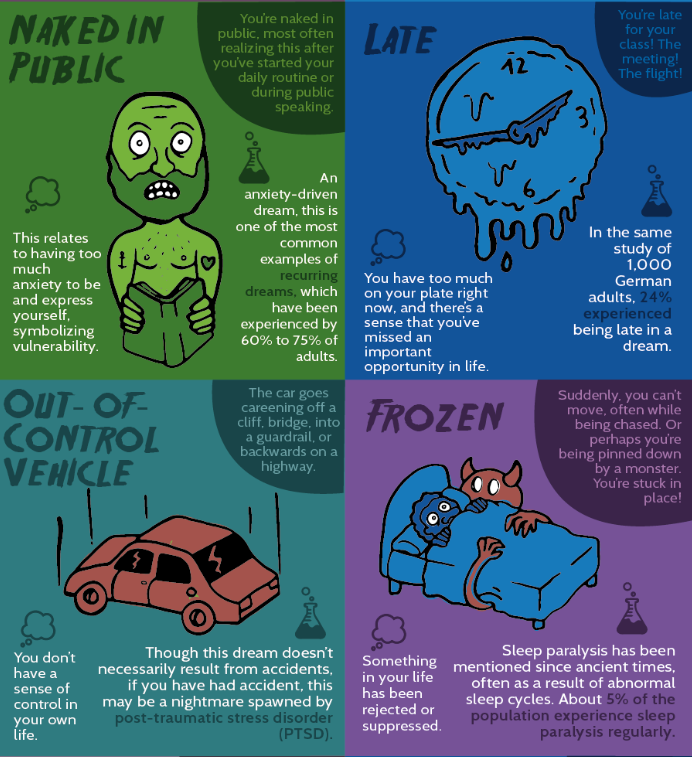
Nightmares are deeply unpleasant but quite common, with around 8 – 29 percent of people experiencing them each month. (1) While the role of dreams and nightmares is not fully understood by science, new research suggests that nightmares and daymares could be early indicators of conditions like lupus and other autoimmune diseases, such as rheumatoid arthritis.
Systemic lupus erythematosus (SLE) is a complicated autoimmune disease that causes various symptoms and can affect many parts of the body. When the disease directly affects the brain and other parts of the nervous system, it is often called neuropsychiatric SLE (NPSLE).
The study, published in eClinicalMedicine, examined the timing of neuropsychiatric (NP) symptoms in relation to the onset and flare-ups of SLE and explored the idea that NP symptoms could be an early sign of SLE.
Nightmares and Daymares May Be Early Warning Signs of Flare-Ups
Researchers gathered information from surveys and interviews with 676 SLE patients and 400 clinicians between 2022 and 2023. One fundamental discovery was that disturbed dreaming, especially nightmares, often came before “daymares” (hallucinations) in SLE patients. Patients in the early stages of the disease might experience psychiatric and neurological symptoms before physical symptoms become noticeable.
The study participants with SLE had a range of horrifying dreams, like witnessing murders or seeing people’s skin coming off. According to the researchers, these dreams were incredibly disturbing and may have been brought on by the stress of being unwell. They usually occurred during a flare-up or right before, so they could be connected to how bad the disease was then.
Nightmares can make the disease even more challenging to deal with, affecting how people feel and their quality of life. The researchers believe keeping an eye on these dreams and recognizing symptoms early could help identify and treat flare-ups more quickly.
Nightmares As a Warning Sign of Lupus and Other Autoimmune Conditions
Kristie Tse, a New York based psychotherapist and clinical director of Uncover Mental Health Counseling, says when her patients report a sudden increase in disturbing dreams, especially those with a history of autoimmune conditions like lupus, she pays close attention.“In my practice, I’ve encountered patients who describe flare-related nightmares involving themes of being attacked, trapped, or falling. Such experiences are not uncommon and can be quite traumatizing,” says Tse.
Lupus and other autoimmune conditions can affect the brain in ways that lead to nightmares. These diseases cause inflammation in various parts of the body, including the brain, which can disrupt normal brain function and cause vivid and often distressing dreams.
For Tse, understanding this connection allows her to provide better support and specific therapeutic approaches for people struggling with nightmares and other neurological symptoms. “These nightmares can be indicative of heightened brain inflammation before physical symptoms manifest,” she says.
Tracking Your Symptoms and Sleep
Tracking your sleep patterns can uncover trends or triggers for SLE and other conditions. Tse recommends monitoring changes in your sleep patterns and being attentive to the content, frequency, and intensity of these dreams. “I encourage my clients to maintain a dream journal to monitor recurrences and share these details with their medical team,” says Tse.
Before bed each night, write down the day’s activities, diet, mood, and any other factors that might affect sleep. In the morning, record how long and well you slept. Over time, this can uncover patterns and potential triggers, and sharing your concerns can help with early intervention and prevent severe flare-ups.
You can also use wearable devices like smartwatches or fitness trackers or try a sleep-tracking app. A medical sleep study in a sleep lab under the supervision of a healthcare professional could be ideal for getting a detailed analysis of your sleep patterns and possible connections.
How to Manage Nightmares Caused By Flare-Ups
Disrupted sleep from autoimmune-related nightmares can harm overall wellbeing by causing fragmented sleep and daytime fatigue, according to Tse. Disturbing nightmares typically cause people to wake suddenly, disrupting sleep cycles and increasing anxiety around sleep.
To help cope with nightmares and sleep disruptions when you have SLE, a combination of medical treatment and lifestyle adjustments is ideal. Most importantly, if you’re having trouble sleeping because of lupus, it’s important to talk to your doctor. Your rheumatology team can figure out why you’re having trouble sleeping and find ways to help you sleep better while treating your lupus. They can also connect you with a sleep specialist to help you deal with your sleep issues.
Tse recommends regular sleep schedules and a calming bedtime routine to alleviate some of these effects, as well as cognitive behavioral therapy for insomnia (CBT-I). “CBT-I effectively improves sleep by tackling the mental aspects of sleep disturbances,” says Tse.
Studies show that nightmares often come from unresolved emotional experiences or trauma, and by processing these experiences during sleep, nightmares may decrease. Before sleeping, practicing meditation and relaxation techniques can help reduce stress and potentially decrease the frequency of nightmares for people with autoimmune conditions, says Tse.

A Guide to Dream Interpretation

How To Keep A Dream Journal: Tips and Benefits

Lucid Dreams: What They Are and How to Experience Them

Interpreting the Most Common Nightmares
Sources
1. Hasler B, Germain A. Correlates and Treatments of Nightmares in Adults. Sleep Med Clin. 2009 Dec;4(4):507-517. doi: 10.1016/j.jsmc.2009.07.012. PMID: 20161576; PMCID: PMC2806673.
Tse, Kristie. Author interview. June 2024.
